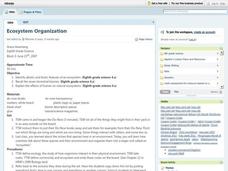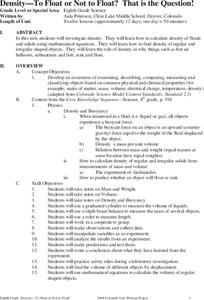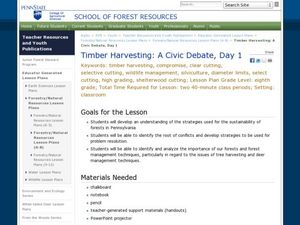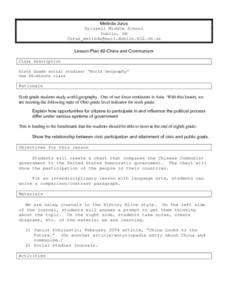Curated OER
Critical Thinking & Writing: Brainstorming
Have your young writers organize their thoughts before writing. They generate ideas through various brainstorming activities prior to writing a mock feature news story for USA Today. A series of USA Today articles debating the level of...
Curated OER
Illustration # 1: Source of Illustration
Students play a game of imitating steady beats by mimicking the instructor. They use drums and repeat the game by echoing rhythmic patterns. The patterns may vary in degree of difficulty according to each individual's ability.
Curated OER
World Percussion Instruments
Fourth graders study percussion instruments from various world cultures. In this percussion instruments lesson, 4th graders listen to percussive sound sources, learn playing techniques, and create compositions for instruments they...
Curated OER
Lesson Plans for 2nd grade Japan Unit
Second graders explore the music and dance of Japan in this five lessons unit. Aspects of Janpanese and American culture are compared. The food, holidays, clothing, and the school day of the two countries are discussed.
Curated OER
Ecosystem Organization
Eighth graders engage in a lesson plan about ecosystems with the intention of looking at how it is organized. They cover the biotic and abiotic factors of an ecosystem while looking at the seven types of terrestrial biomes. Students...
Curated OER
Instruments In Action
Students read and demonstrate eight measures of four beats. In this music reading lesson, students read and demonstrate through movement their mastery of eight measures of four beats. Students also classify instruments.
Curated OER
The African-American Experience in the 20th Century through the Art and Life of Jacob Lawrence and the Novels of Bruce Brooks a
Students attempt to answer how African-American, Latino, and white students address race relations in the United States in the future.
Curated OER
Organ System Interactions
Eighth graders who have studied all of the organ systems now discover how they all are related and work together in the human body. They discuss a variety of situations in which more than one system plays a part. They identify the...
Curated OER
Orbit, rotation, revolution of Earth
Eighth graders define orbit, rotation and revolution. They demonstrate the orbit, rotation and revolution of the Earth. Students identify the types of measurements and the instruments that used for orbit, rotation and revolution. They...
Curated OER
A Multimedia Science Project: Minorities and Women in Science
Eighth graders create a multimedia presenttation written presentation, and oral presentation detailing the contributions of three minority or female scientists throughout history.
Curated OER
Natural Selection I
Eighth graders list the steps of Darwin's natural selection. They demonstrate the process of natural selection in a predation activity. Students create paper origami frogs to race across the floor and analyze the differences in the...
Curated OER
Organ Systems: Excretory, Digestive, Immune, and Nervous
Eighth graders identify and describe the components of various body systems. They create vocabulary flash cards identifying the excretory, digestive, immune, and nervous systems and describing their functions. Students complete a...
Curated OER
Equivalent Fraction Licorice
Students discuss the meaning of "equivalent" and look for similarities in a bag of pre-cut licorice given to their group. In this math lesson, students experiment with making equivalent pieces of licorice from other pieces. Students...
Curated OER
Rhythm Counting
Learners perform various rhythms and melodies in unison on their individual instruments. Assessment is performed on the last day of the lesson with each student playing individually for the class. This lesson meets national standards...
Curated OER
Density - To Float or Not to Float? That is the Question!
Students investigate how to find the density of fluids and solids using math. Students also learn how to find the density of regular and irregular shaped objects.
Curated OER
Timber Harvesting: A Civic Debate, Day 1
Eighth graders develop an understanding of the strategies used in the sustainability of forests. In this timber harvesting instructional activity students identify and analyze the importance of forests and their management...
Curated OER
Water Quality
Students examine water quality and how to improve it, how to measure it and how it relates to human activities. In this water quality lesson students sample water from different sources, and test the samples.
Curated OER
Decoding DNA
Third graders complete their KWL charts from the first lesson of the unit as a review for the summative. Then they decode a secret message using the four basic components of DNA, adenine, cytosine, guanine and thymine.
Curated OER
More Bait for Your Buck!
Learners determine where to buy the heaviest earthworms as they study invertebrates. They create a double bar graph of the results of the weight data.
Curated OER
China and Communism
Sixth graders discuss what might happen if United States government took over media ownership, read Junior Scholastic article entitled "China Looks to the Future," and create chart comparing Chinese Communist government to United States...
Curated OER
China: Culture and Young Adult literature
Eighth graders are introduced to Chinese language and culture to make Asian reading selections in literature circles more meaningful. They write about Chinese characters, work on oral speaking, and read Asian books and then have...
Curated OER
Japan and The Ring of Fire
Learners engage in a study of the volcanic forces and earthquakes associated with The Ring of Fire in the Pacific Ocean. The people of Japan are researched in how they have dealt with living in the area. Also students write in journals...
Curated OER
Hey, I've Got A Question!
Seventh graders explore the Solar System. They develop a research question and use inquiry-based research skills to find the answers to their questions. Students write up their findings and create a multimedia presentation.
Curated OER
Models for Dividing Fractions
Sixth graders represent division of fractions using manipulatives, such as freezer pops, candy bars, and models such as drawings squares. They develop an algorithm from these examples and solve problems using fractions.

























